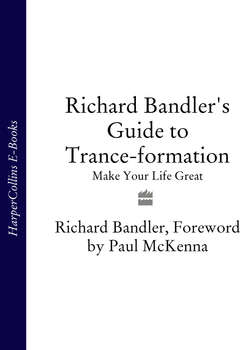Читать книгу Richard Bandler's Guide to Trance-formation: Make Your Life Great - Richard Bandler - Страница 14
TEMPORAL PREDICATES
ОглавлениеFor my part, I find temporal predicates—words that refer to time and its passage—incredibly powerful. I use temporal predicates as linkage—“when you sit here breathing in and out, then you will relax, and as you think about this for the last time…” But there are many more ways temporal language can be used.
Inducing confusion increases suggestibility—for example:
[B]efore you stop yourself from preventing the idea that you don’t know what’s coming later, it’ll be here, but before we start to continue with what isn’t important about what you don’t know, you’ll find that you’ve just begun to go backwards, because the past is just a future moving by now…
This passage demonstrates how language patterns can be layered. Aside from the temporal predicates, that last sentence is stacked with ambiguities—words and phrases that could have more than one meaning, leaving the unconscious room to explore alternatives that have not been explicitly stated.
Another reason I regard temporal predicates as particularly important is to make clear the very important distinction between the past and the future. The best thing about the past is that it’s over. When people don’t deal with the past as if it’s over, then they’re not free to go into the future. That’s why I particularly love the ambiguity that “the past is just a future moving by now…” (I suggest that you reread that sentence very carefully to find out for yourself how many meanings it contains.)
